- Home
- Julia Quinn
A Night Like This (Smythe-Smith Quartet) Page 7
A Night Like This (Smythe-Smith Quartet) Read online
Page 7
Daniel’s blood was rushing far too quickly to take a seat. “I would rather stand.”
“Excuse me, then, if I sit,” Hugh said with a self-deprecating twist of his lips. He made his way over to a chair, awkwardly, and then lowered himself down. When he finally took his weight off his bad leg, he sighed with audible relief.
This, he was not faking. He might be lying about other things, but not this. Daniel had seen Hugh’s leg. It was twisted and puckered, its very existence an improbable feat of medicine. That he could put any weight on it at all was a miracle.
“Do you mind if I have drink?” Hugh inquired. He rested his cane on a table and then began to knead the muscles in his leg. He did not bother to hide his pain from his face. “It’s over there,” he winced, jerking his head toward a cabinet.
Daniel crossed the room and extracted a bottle of brandy. “Two fingers?” he asked.
“Three. Please. It’s been a long day.”
Daniel poured the drink and brought it over. He had not touched alcohol since that fateful drunken night, but then again, he did not have a shattered leg that needed numbing.
“Thank you,” Hugh said, his voice somewhere between a groan and a whisper. He took a long swallow, and then another, closing his eyes as the fire rolled down his throat. “There,” he said, once he’d regained his composure. He set the glass down and looked up. “I was told that your injuries came at the hands of Lord Chatteris.”
“That was something else,” Daniel said dismissively. “I was attacked by two men as I was walking home this evening.”
Hugh straightened, his eyes sharpening. “Did they say anything?”
“They demanded money.”
“But did they know your name?”
Daniel shook his head. “They did not say it.”
Hugh was silent for a long moment, then said, “It’s possible they were ordinary footpads.”
Daniel crossed his arms and stared at him.
“I told you that I extracted a promise from my father,” Hugh said quietly. “He will not touch you.”
Daniel wanted to believe him. In fact, he did believe him. Hugh had never been a liar. Nor did he possess a vengeful nature. But was it possible Hugh had been duped?
“How do I know your father can be trusted?” Daniel asked. “He has spent the last three years in the pursuit of my death.”
“And I have spent the last three years convincing him that this”—Hugh curled his lip and waved his hand over his ruined leg—“was as much my fault as yours.”
“He would never believe that.”
“No,” Hugh agreed. “He is a stubborn ass. He always has been.”
It was not the first time Daniel had heard Hugh refer to his father in such terms, but still, he was taken aback. There was something about the plainness of Hugh’s tone that was unnerving.
“How can I know that I will be safe?” Daniel demanded. “I returned to England on the strength of your word, on your belief that your father would honor his promise. If something happens to me, or if, God help you, any member of my family, I will hunt you down to the ends of the earth.”
Hugh did not need to point out that if Daniel was killed, there would be no hunting to be done.
“My father signed a contract,” Hugh said. “You have seen it.”
Daniel even possessed a copy. So did Hugh and Lord Ramsgate, and Hugh’s solicitor, who was under strict instructions to keep it under lock and key. But still . . .
“He would not be the first man to disregard a signed document,” Daniel said in a low voice.
“Indeed.” Hugh’s face was pinched, and there was a long-standing look to the shadows under his eyes. “But he will not disregard this one. I have made sure of it.”
Daniel thought of his family, of his sister and mother, and his rollicking, giggling Pleinsworth cousins, whom he was just beginning to know again. And he thought of Miss Wynter, her face springing to the forefront of his mind. If something happened to him before he had the chance to know her . . .
If something happened to her . . .
“I need to know how you can be so certain,” Daniel said, his voice dropping into a furious hush.
“Well . . .” Hugh brought his glass to his lips and took something deeper than a sip. “If you must know, I told him that if anything happens to you, I would kill myself.”
If Daniel had been holding anything, anything at all, it would have crashed to the ground. It was a remarkable thing that he did not crash to the ground.
“My father knows me well enough to know that I do not say such a thing lightly,” Hugh said, lightly.
Daniel couldn’t speak.
“So if you would . . .” Hugh took another drink, this time barely touching his lips to the liquid. “I would appreciate if you would endeavor not to get yourself killed in an unhappy accident. I’m sure to blame it on my father, and honestly, I’d rather not see myself off unnecessarily.”
“You’re mad,” Daniel whispered.
Hugh shrugged. “Sometimes I think so. My father would certainly agree.”
“Why would you do such a thing?” Daniel could not imagine anyone else—not even Marcus, who was truly a brother to him—making the same sort of threat.
Hugh was silent for a very long while, the unfocused stare of his eyes broken only by the occasional blink. Finally, just when Daniel was sure that he would never answer, he turned and said, “I was stupid when I called you a cheat. I was drunk. And I believe you were drunk, too, and I did not believe you had the ability to beat me.”
“I didn’t,” Daniel said. “All I had was luck.”
“Yes,” Hugh agreed. “But I don’t believe in luck. I never have. I believe in skill, and even more in judgment, but I had no judgment that night. Not with cards, and not with people.”
Hugh looked at his glass, which was empty. Daniel thought about offering to refill it, then decided that Hugh would ask if that was what he wanted.
“It was my fault that you had to leave the country,” Hugh said, setting his glass on the table next to him. “I could not live with myself any longer, knowing that I had ruined your life.”
“But I have also ruined yours,” Daniel said quietly.
Hugh smiled, but it only touched one side of his mouth, and neither of his eyes. “It’s just a leg.”
But Daniel didn’t believe him. He didn’t think Hugh believed himself, either.
“I will see to my father,” Hugh said, bringing a briskness to his tone that signaled their interview was coming to an end. “I do not believe he would be foolish enough to have been responsible for what happened to you this evening, but just in case, I shall remind him of my threat.”
“You will inform me of the outcome of the meeting?”
“Of course.”
Daniel made his way to the door, and as he turned to say good-bye, he saw that Hugh was struggling to rise to his feet. His tongue touched the top of his mouth, ready to say, Don’t, but he bit back the word. Every man needed his pride.
Hugh reached out and grasped his cane, then made his achingly slow progress across the room to see Daniel out. “Thank you for coming this evening,” Hugh said. He held out his hand, and Daniel took it.
“I am proud to call you my friend,” Daniel said. He left then, but not before he saw Hugh turn swiftly away, his eyes wet with tears.
The following afternoon, after spending the morning in Hyde Park doing three remeasurements of Rotten Row, Anne sat at a writing desk in the Pleinsworth sitting room, tickling her chin with the feather of her quill as she considered which items to put on her to-do list. It was her afternoon free, and she’d been looking forward all week to running errands and shopping. Not that she ever had much to purchase, but she rather enjoyed poking about in shops. It was lovely to have a few moments during which she had responsibility for no one but herself.
Her preparations, however, were interrupted by the arrival of Lady Pleinsworth, who came sailing into the room in a swish
of pale green muslin. “We leave tomorrow!” she announced.
Anne looked up, thoroughly confused, then stood. “I beg your pardon?”
“We cannot remain in London,” Lady Pleinsworth said. “Rumors are flying.”
They were? About what?
“Margaret told me that she has heard talk that Sarah was not actually ill on the night of the musicale and was instead trying to spoil the concert.”
Anne did not know who Margaret was, but it could not be denied that the lady was well informed.
“As if Sarah would do such a thing,” Lady Pleinsworth continued. “She is such a superior musician. And a dutiful daughter. She looks forward to the musicale all year.”
There was no comment Anne could make about that, but fortunately for her, Lady Pleinsworth did not seem to require a response.
“There is only one way to combat these vicious lies,” she continued, “and that is to leave town.”
“To leave town?” Anne echoed. It seemed extreme. The season was just getting underway, and she’d thought that their main objective was to find a husband for Lady Sarah. Which they were unlikely to do back in Dorset, where the Pleinsworths had lived for seven generations.
“Indeed.” Lady Pleinsworth let out a brisk sigh. “I know that Sarah looks as if her health has improved, and perhaps it has. But as far as the rest of the world is concerned, she must be at death’s door.”
Anne blinked, trying to follow the countess’s logic. “Wouldn’t that require the services of a physician?”
Lady Pleinsworth waved this off. “No, just healthful country air. Everyone knows one can’t properly convalesce in the city.”
Anne nodded, secretly relieved. She preferred life in the country. She had no connections in the southwest of England, and she liked it that way. Plus there was the complication of her infatuation with Lord Winstead. It behooved her to nip that squarely in the bud, and two hundred miles of countryside between the two of them seemed the best way to do it. Setting down her pen, she asked Lady Pleinsworth, “How long will we be in Dorset?”
“Oh, we’re not going to Dorset. And thank heavens for that. It’s such a grueling journey. We’d have to stay at least a fortnight for anyone to think Sarah had got the least bit of rest and respite.”
“Then wh—”
“We’re going to Whipple Hill,” Lady Pleinsworth announced. “It is only near Windsor. It won’t even require a full day to get there.”
Whipple Hill? Why did that sound familiar?
“Lord Winstead suggested it.”
Anne suddenly began to cough.
Lady Pleinsworth regarded her with some concern. “Are you quite well, Miss Wynter?”
“Just . . . ehrm . . . some . . . ehrm ehrm . . . dust in my throat. I think.”
“Well, do sit down, if you think it will help. There is no need to stand on ceremony with me, at least not at the moment.”
Anne nodded gratefully and retook her seat. Lord Winstead. She should have known.
“It is an ideal solution for us all,” Lady Pleinsworth continued. “Lord Winstead wants to leave London, too. The notoriety, you know. Word is getting out that he has returned, and he will be deluged with callers. Who can blame the man for desiring a peaceful reunion with his family?”
“Then he will be accompanying us?” Anne asked carefully.
“Of course. It is his property. It would seem odd if we traveled there without him, even if I am his favorite aunt. I believe his sister and mother will be coming as well, although I am not certain.” Lady Pleinsworth paused for breath, looking quite satisfied with the recent turn of events. “Nanny Flanders will supervise the packing for the girls, since it is your afternoon free. But if you would look everything over when you return, I would be most appreciative. Nanny is a dear, but she is getting on in years.”
“Of course,” Anne murmured. She adored Nanny, but she’d long since gone a bit deaf. Anne had always admired Lady Pleinsworth for keeping her on, but then again, she had been nurse to Lady Pleinsworth as a child, and Lady Pleinsworth’s mother.
“We will be gone for a week,” Lady Pleinsworth continued. “Please make sure you pack enough lessons to keep the girls busy.”
A week? At the home of Lord Winstead? With Lord Winstead in residence?
Anne’s heart sank and soared at the same time.
“Are you certain you are all right?” Lady Pleinsworth asked. “You’re looking terribly pale. I do hope you have not caught Sarah’s complaint.”
“No, no,” Anne assured her. “That would have been impossible.”
Lady Pleinsworth looked at her.
“What I mean to say is, I haven’t been in contact with Lady Sarah,” Anne said hastily. “I’m perfectly well. I need only a bit of fresh air. It is as you said. It cures everything.”
If Lady Pleinsworth found that stream of babble to be out of character, she did not say so. “Well, then, it is good timing that you have the afternoon to yourself. Do you plan to go out?”
“I do, thank you.” Anne rose to her feet and bustled over to the door. “I had best be on my way. I have many errands to attend to.” She bobbed a quick curtsy, then dashed back up to her room to collect her things—a light shawl, in case the air grew cool, her reticule with a bit of pin money, and —she opened her bottom drawer and slid her hand under her meager stack of clothing—there it was. Carefully sealed and ready to be posted. Anne had enclosed a half crown in her last letter, so she was confident that Charlotte would be able to pay the postage when this one arrived. The only trick was making sure that no one else realized who had actually sent the letter.
Anne swallowed, surprised by the lump in her throat. One would think she’d be used to it by now, having to sign a false name in her letters to her sister, but it was the only way. Doubly false, actually. She didn’t even sign them Anne Wynter, which she supposed was as much her name as Annelise Shawcross had ever been.
Carefully, she placed the letter in her reticule and headed down the stairs. She wondered if the rest of her family had ever seen her missives, and if so, who they thought Mary Philpott was. Charlotte would have had to have come up with a good story for that.
It was a fine spring day, with just enough breeze to make her wish her bonnet was more securely fastened. She headed down past Berkeley Square toward Piccadilly, where there was a receiving house just off the main road where she liked to drop her letters. It wasn’t the closest spot to Pleinsworth House, but the area was busier, and she preferred the deeper cloak of anonymity it offered. Besides, she liked to walk, and it was always a treat to do so at her own pace.
Piccadilly was as crowded as ever, and she turned east, passing by several shops before lifting the hem of her skirt a few inches in order to cross the street. A half dozen carriages rolled by, but none quickly, and she easily picked her way across the cobbles, stepped onto the pavement, and—
Oh, dear God.
Was it . . . ? No, it couldn’t be. He never came down to London. Or at least he didn’t. That was to say, he hadn’t, and—
Anne’s heart pounded in her chest, and for a moment she felt the edges of her sight begin to blacken and curl. She forced air into her lungs. Think. She had to think.
The same coppery blond hair, the same devastatingly handsome profile. His looks had always been unique; it was difficult to imagine he had an unknown twin in the capital, gadding about on Piccadilly.
Anne felt tears, hot and furious, burning behind her eyes. This was not fair. She had done everything that had been expected of her. She had cut off ties with everything and everyone she had known. She had changed her name, and gone into service, and promised that she would never, ever speak of what had happened in Northumberland so very long ago.
But George Chervil had not kept his part of the bargain. And if that was indeed him, standing outside Burnell’s Haberdashery . . .
She could not stand there like a target and wait to find out. With a choked cry of frustration, she turned on h
er heel and ran . . . into the very first shop she came across.
Chapter Six
Eight years earlier . . .
Tonight, Annelise thought with growing excitement. Tonight would be the night.
It would be a bit of a scandal, her becoming engaged before either of her older sisters, but it would not be entirely unexpected. Charlotte had never shown great interest in their local society, and Marabeth always looked so pinched and angry—it was hard to imagine anyone wanting to marry her.
Marabeth would have a fit, though, and their parents would surely console her, but for once they would not force their youngest daughter to give up a prize for the sake of the eldest. When Annelise married George Chervil, the Shawcrosses would become forever connected with the most important family in their corner of Northumberland. Even Marabeth would eventually realize that Annelise’s coup was in her best interest.
A rising tide did indeed lift all boats, even prickly ones named Marabeth.
“You look rather like a cat in cream,” Charlotte said, watching Annelise as she examined herself in her mirror, testing one set of earbobs against the other. They were paste, of course; the only proper jewels in the Shawcross family belonged to their mother, and all she had besides her wedding ring was a small broach, with three tiny diamonds and one large topaz. It wasn’t even very pretty.
“I think George is going to ask me to marry him,” Annelise whispered. She never could keep secrets from her sister. At least not until recently. Charlotte knew most of the details of Annelise’s monthlong secret courtship, not all of them.
“Never say it!” Charlotte gasped with delight and clasped both of her sister’s hands in hers. “I am so happy for you!”
“I know, I know.” Annelise could not keep herself from grinning. Her cheeks would hurt by the end of the night, she was sure. But she was so happy. George was everything she had ever wanted in a husband. He was everything any girl had ever wanted—handsome, athletic, dashing. Not to mention incredibly well-connected. As Mrs. George Chervil, Annelise would live in the finest house for miles. Her invitations would be coveted, her friendship desired. Maybe they would even go to London for the season. Annelise knew that such travels were dear, but George would one day be a baronet. At some point he would need to take his proper place in society, wouldn’t he?

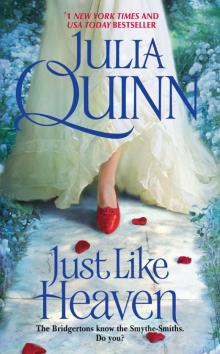 Just Like Heaven
Just Like Heaven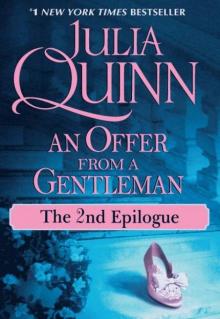 B03.2 An Offer from a Gentleman Ep II
B03.2 An Offer from a Gentleman Ep II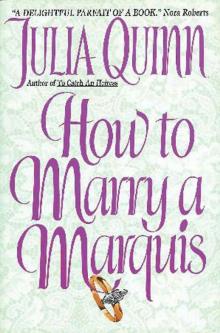 How to Marry a Marquis
How to Marry a Marquis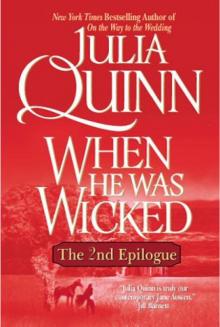 When He Was Wicked: The 2nd Epilogue
When He Was Wicked: The 2nd Epilogue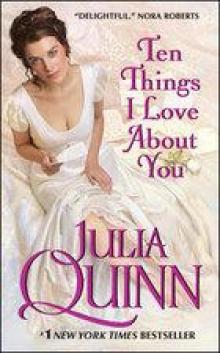 Ten Things I Love About You
Ten Things I Love About You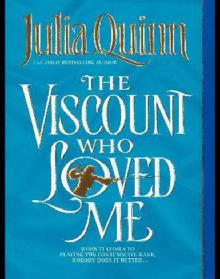 The Viscount Who Loved Me
The Viscount Who Loved Me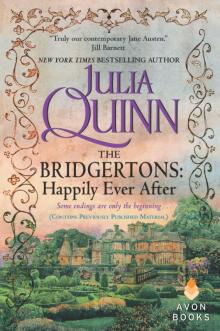 The Duke and I
The Duke and I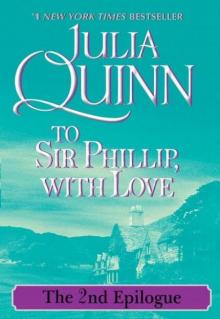 B05.2 To Sir Philip With Love Ep II
B05.2 To Sir Philip With Love Ep II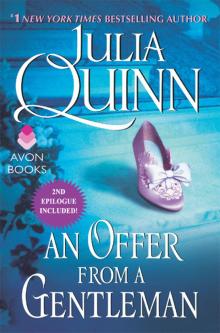 An Offer From a Gentleman: The 2nd Epilogue
An Offer From a Gentleman: The 2nd Epilogue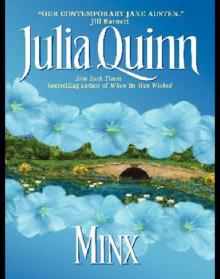 Minx
Minx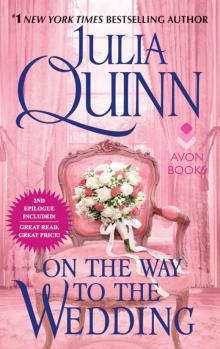 On the Way to the Wedding with 2nd Epilogue
On the Way to the Wedding with 2nd Epilogue Mr. Cavendish, I Presume
Mr. Cavendish, I Presume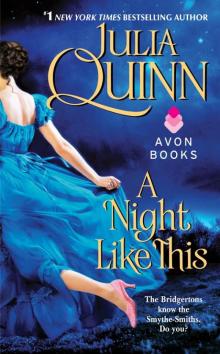 A Night Like This
A Night Like This Splendid
Splendid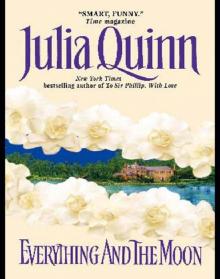 Everything and the Moon
Everything and the Moon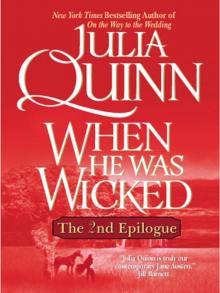 When He Was Wicked
When He Was Wicked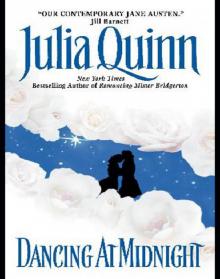 Dancing at Midnight
Dancing at Midnight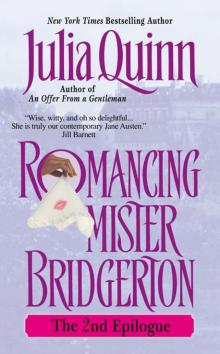 Bridgerton 04: 2nd Epilogue - Romancing Mister Bridgerton
Bridgerton 04: 2nd Epilogue - Romancing Mister Bridgerton The Lost Duke of Wyndham
The Lost Duke of Wyndham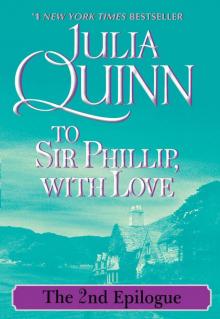 To Sir Phillip, With Love
To Sir Phillip, With Love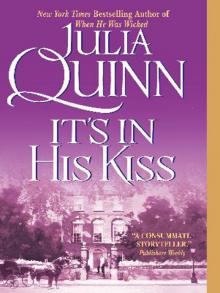 It's in His Kiss
It's in His Kiss The Other Miss Bridgerton
The Other Miss Bridgerton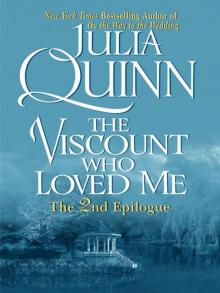 Bridgerton 02: 2nd Epilogue - The Viscount Who Loved Me
Bridgerton 02: 2nd Epilogue - The Viscount Who Loved Me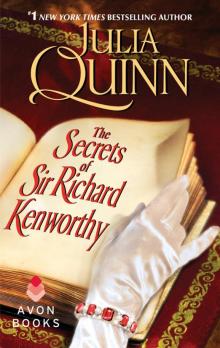 The Secrets of Sir Richard Kenworthy
The Secrets of Sir Richard Kenworthy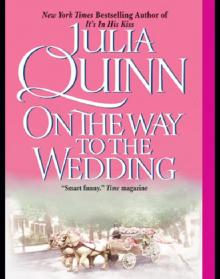 On the Way to the Wedding
On the Way to the Wedding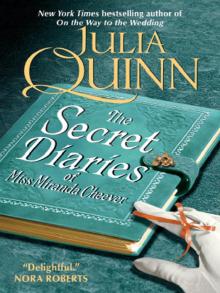 The Secret Diaries of Miss Miranda Cheever
The Secret Diaries of Miss Miranda Cheever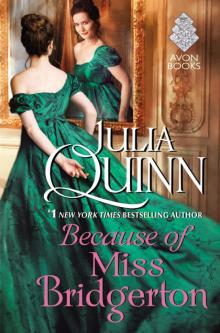 Because of Miss Bridgerton
Because of Miss Bridgerton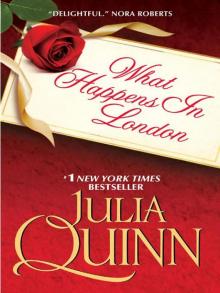 What Happens in London
What Happens in London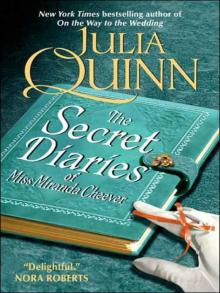 JQuinn - The Secret Diaries of Miss Miranda Cheever
JQuinn - The Secret Diaries of Miss Miranda Cheever The Girl With the Make-Believe Husband
The Girl With the Make-Believe Husband First Comes Scandal
First Comes Scandal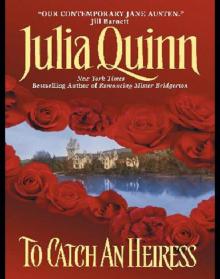 To Catch an Heiress
To Catch an Heiress The Sum of All Kisses
The Sum of All Kisses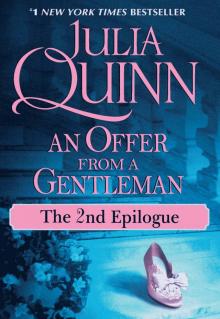 An Offer From a Gentleman
An Offer From a Gentleman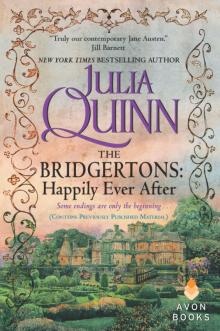 The Bridgertons: Happily Ever After
The Bridgertons: Happily Ever After Bridgerton Collection Volume 1 (Bridgertons)
Bridgerton Collection Volume 1 (Bridgertons)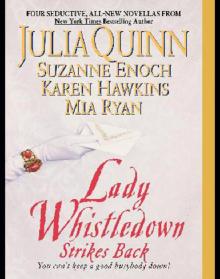 Lady Whistledown Strikes Back
Lady Whistledown Strikes Back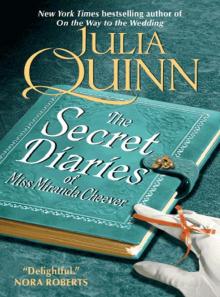 Secret Diaries of Miss Miranda Cheever
Secret Diaries of Miss Miranda Cheever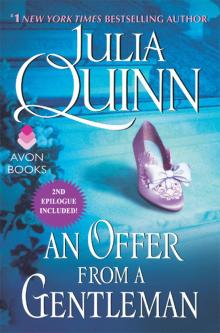 An Offer from a Gentleman with 2nd Epilogue
An Offer from a Gentleman with 2nd Epilogue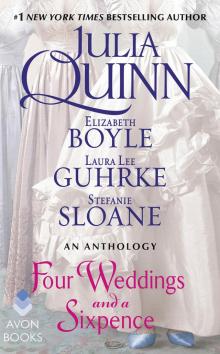 Four Weddings and a Sixpence
Four Weddings and a Sixpence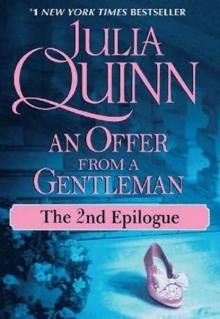 An Offer from a Gentleman: The Epilogue II
An Offer from a Gentleman: The Epilogue II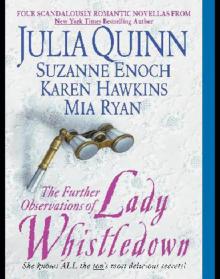 The Further Observations of Lady Whistledown
The Further Observations of Lady Whistledown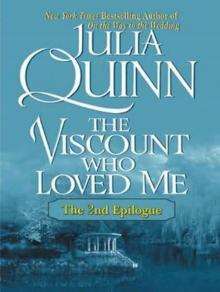 The Viscount Who Loved Me: The Epilogue II
The Viscount Who Loved Me: The Epilogue II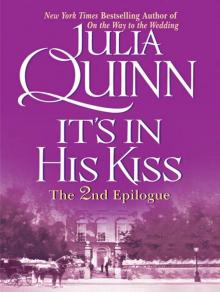 It’s In His Kiss Epilogue II
It’s In His Kiss Epilogue II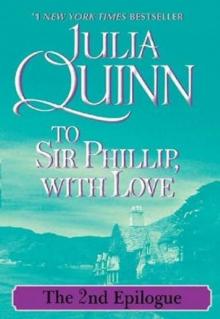 To Sir Phillip, with Love: The Epilogue II
To Sir Phillip, with Love: The Epilogue II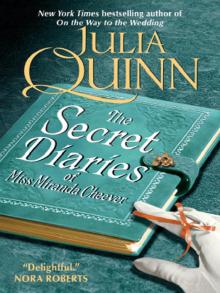 The Secret Diaries of Miss Miranda Cheevers
The Secret Diaries of Miss Miranda Cheevers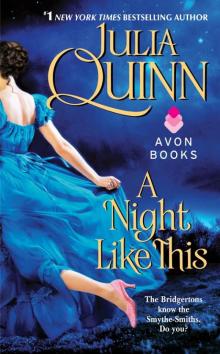 A Night Like This (Smythe-Smith Quartet)
A Night Like This (Smythe-Smith Quartet)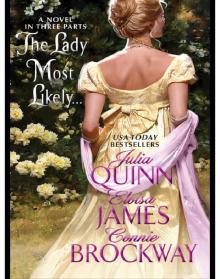 The Lady Most Likely...
The Lady Most Likely...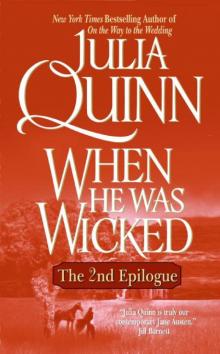 Bridgerton 06: 2nd Epilogue - When He Was Wicked
Bridgerton 06: 2nd Epilogue - When He Was Wicked Just Like Heaven sq-1
Just Like Heaven sq-1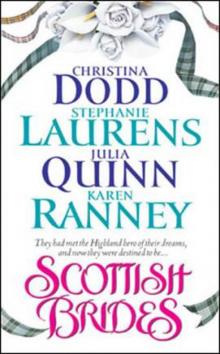 Gretna Greene
Gretna Greene